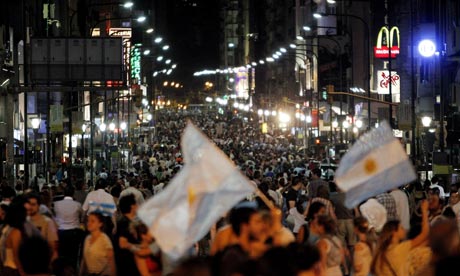Argentina protests: up to half a million rally against Fernández de Kirchner
Rowdy demonstrations against corruption mark escalation of opposition to President Cristina Fernández de Kirchne
Argentina protests: thousands march through Buenos Aires as part of a nationwidecacerolazo, a protest in which demonstrators beat pans and pots. Photograph: EPA
The broad avenues of Buenos Aires were crowded on Thursday night byArgentina's biggest and noisiest anti-government demonstration in a decade, as hundreds of thousands of protesters marched or banged pots to express frustration at President Cristina Fernández de Kirchner.
After a smaller rally in September, the noisy but peaceful protest – estimated at between 250,000 to 500,000 people – marks an escalation of opposition to the Argentinian leader, particularly among a middle class that is upset at inflation, corruption, media controls and suggestions Fernández may want to amend the constitution so she can serve a third term.
Congregating around the landmark obelisk in the centre of the capital, protesters carried handmade signs demanding "Stop corruption" and "No Re-election" while they chanted: "This is for Cristina who is watching us on TV." Tens of thousands of others joined a cacerolazo (casserole) demonstration outside the presidential palace, beating kitchen utensils so loudly their clamour cannot have been ignored inside.
Word of the demonstration spread through social networks. Many organisers remain anonymous, but Mariana Torres, administrator of the Facebook page El Anti-K, one of the most active in calling for the rally, said she was delighted: "It was a true feast for democracy."
There was no single cause of discontent. Many in the middle class are angry at the highest inflation in a decade, estimated at a yearly 25% by private economists, currency controls that have created a black market in dollars, and one of the slowest economic growth rates in Latin America.
Banners and chants also took aim at recent corruption cases and Fernández's efforts to limit the power of big newspaper and TV conglomerates. Clarín, the country's most powerful media group, has stepped up its criticism of the government before the introduction on 7 December of a law that will weaken its empire.
Before the protest, Fernández vowed "not to slacken, even in our worst moments". With the opposition in disarray and GDP moving in a positive direction, her allies played down the significance of the rally. "I didn't lose any sleep over the march last night and I'm not going to lose any sleep over it today," said Senator Aníbal Fernández, one of the president's closest aides. "I don't understand what the message is."
But it marks a political low in Fernández's decade in the presidential palace. Since succeeding her husband, Néstor Kirchner, in 2007, she has won two landslide election victories and pursued a policy marked by wealth redistribution, greater investment in education, confrontation with Britain over the Falklands and the nationalisation of the Argentinian assets owned by the Spanish oil group YPF.
With the economy faltering, Fernández's approval rating has fallen below 40%, according to a poll this week, and many of those who joined Thursday's protest have lost faith in her.
"I voted for Cristina but now I feel let down," said one middle-aged marcher. "We need more security, more jobs; the government needs to stop lying to us."
Opposition politicians hope this week's march through 9 de Julio Avenue will prevent proposed constitutional changes that would allow the president to run for more than two terms.
"People are saying 'enough!'" said Senator María Eugenia Estenssoro, who joined the demonstration. "Enough corruption, enough lies. It will be very hard for her to change the constitution after tonight."
Fernández has not said she would run again, but her allies are encouraging her to do so. If she pushed ahead, it would further comparisons with Hugo Chávez, who also extended his term, confronted major media conglomerates and used public broadcasting to spread his political message.
That may be more difficult in Argentina. To reform the constitution, she would have to win by a substantial margin in next year's mid-term legislative elections to obtain the two-thirds majority needed in congress.
After Thursday's massive protest, that looks a distant prospect. But the organisers of the march say the battle with the Kirchneristas is far from over. "They can't see reality, even when it's in their faces," said Torres. "They're just going to carry on as if nothing has happened."








.jpg)

No comments:
Post a Comment